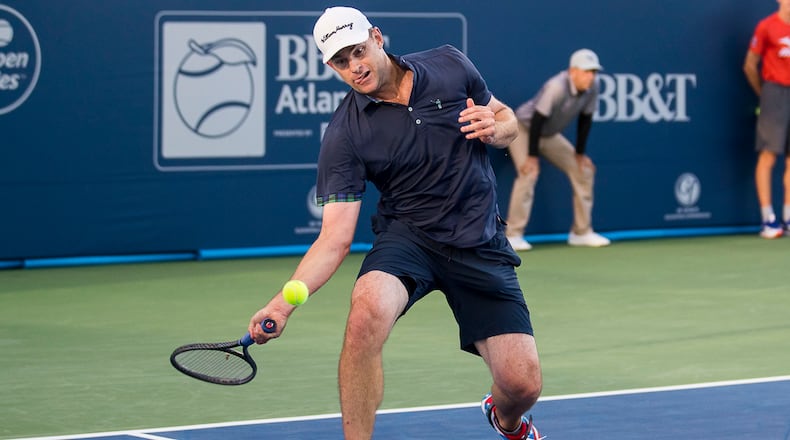Andy Roddick will be playing with John Isner against the Bryan Brothers in an exhibition match Monday night to help kick off the Atlanta Open one final time.
Roddick said, “It’s gonna be fun. You know all three of them are good friends of mine, and we have a bunch of history. … We’ll have fun kinda celebrating what Atlanta has meant to our careers.”
Roddick first won the Atlanta Open in 2012 and has had a great experience overall in Atlanta.
He said, “It’s interesting with Atlanta specifically, it was the first tournament I ever won on tour back when it was a clay-court event and you played in April and it was the last tournament I won in my career. … It was the booking to any winning.”
Although all four players are retired, each player is ecstatic for this matchup, as all players are long-time friends.
The Bryan Brothers will look to showcase their doubles expertise at 7 p.m. Monday at Atlantic Station, while Roddick and Isner are celebrated widely for their singles game, and will be set to give the brothers a challenge.
“We’re all very competitive, especially Andy,” Isner said. “We want to win, and I don’t want to let him down.”
In his career, Roddick is the last American man to win the U.S. Open, in 2003. He also reached four other major finals and finished in the top 10 of the ATP rankings for nine consecutive years.
Reflecting on his career, Roddick stated that tennis is more than a game and can install a strong work ethic.
He said, “You know, you could work your butt off and not see the fruits of that work for six months to a year, but you do need to be prepared for when that moment comes.”
He continued, “Anything positively or negatively, if it was positive it affected my work; if it was a negative result, it certainly wasn’t because of a lack of work. … You can wish for a different result, but I am pretty proud of the process.”
Roddick also discussed the mental aspect of tennis.
“I think being able to compartmentalize is a gift,” he said. “I think a lot of players, not even just juniors, but pros, spend a lot of time worrying about stuff that they can’t actually control. If there’s wind, if there’s an overbearing coach, whatever it might be, I think it’s worth kind of intentionally thinking about what are the things that I can control day to day, maxing out those things and then letting everything else kinda fall where it can.”
He continued, “You train these psychotic hours, and the isolated nature is just what you’ve done since you were a kid. I think since I’ve retired and had space from it, I’m probably more impressed by what you have to do to be successful (as a pro).”
Roddick is finding contentment in life beyond tennis, emphasizing his current focus on his family and other aspects.
“I think the most fulfilling parts of my life have probably come post-tennis,” Roddick said. “More time to invest in different interests, whether it’s business or philanthropy. Obviously kids being born, kind of teaching, no matter what you’ve done in your career, you can still be dominated daily by things that are two feet tall.”
He continued, “I think this part of life is probably my favorite, it’s a lot of the benefit. You know the day-to-day stressors of tennis are real, and I’m thankful for them. I think they’re incredibly shaping in a great way, but I don’t miss it on an average Tuesday.”
In retirement, Roddick started the Andy Roddick Foundation that serves an average of 40,000 kids a day in the Central Texas area. With starting it, he helps give credit back to his own tennis heroes who put the game of tennis all in perspective.
“The foundation has been great,” Roddick said. “I think the inspiration was just tennis in general. I was lucky enough to exist in the right vacuum, and I’m pretty proud of the tennis lineage to champions that used whatever they did on court to have a bigger voice in something that was bigger than tennis or them.”
He also said, “I think when you see your heroes doing great stuff away from the court, I think it does become contagious even before you fully understand the magnitude of benefit.”
Along with continuing to build off the Andy Roddick foundation, Roddick is busy with a podcast called, “Served with Andy Roddick.”
“‘Served’ has been fun. I think the media space of tennis was largely ignored if it wasn’t around a live event. That was kind of a market we thought we could serve. (Laughing) No pun intended,” Roddick said.
He continued, “It’s a lot of work, we’re constantly pushing content on a lot of avenues that have been largely ignored by tennis media. … It’s been great, our weekly viewers are fantastic and people seem to be responding, so we’ll keep at it.”
About the Author
Keep Reading
The Latest
Featured




